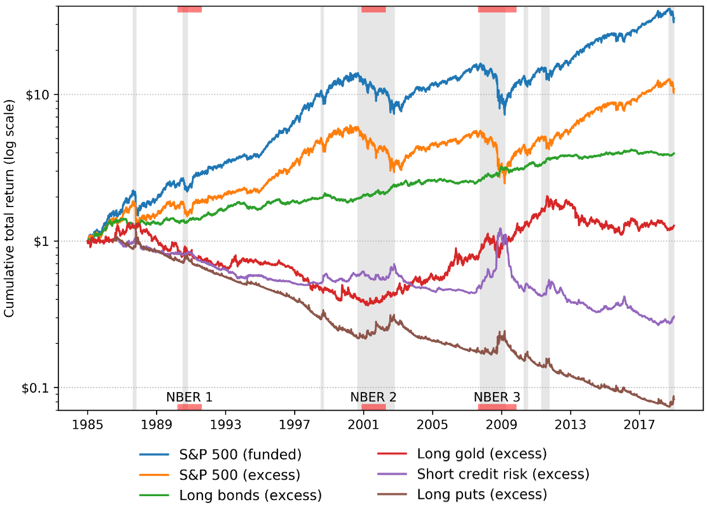Introduction
In the late stages of long bull markets, a popular question arises: what steps can an investor take to mitigate the impact of a large equity correction?
In our paper, ‘The Best of Strategies for the Worst of Times’, we analyse the performance of different defensive strategies, both active and passive, between 1985 and 2018, with a particular emphasis on the eight worst drawdowns (the instances where the S&P 500 Index fell by more than 15%) and three US recessions. To guard against overfitting, we provide out-of-sample evidence of the performance of these strategies in the drawdown that occurred in the fourth quarter of 2018, after we wrote an earlier, related paper.1
Passive Strategies
We begin with two passive strategies, both of which benefit directly from a falling equity market.
A strategy that buys, and then rolls, 1-month S&P 500 put options performs well in each of the eight equity drawdown periods. However, it is very costly – leading to a return drag of nearly 8% per year – during the ‘normal’ times, which constitute 86% of our sample and expansionary (non-recession) times, which constitute 93% of our observations. As such, passive option protection seems too expensive to be a viable crisis hedge.
A strategy that is long credit protection (short credit risk) also benefits during each of the eight equity drawdown periods, but in a more uneven manner, doing particularly well during the 2007-2009 Financial Crisis, which was a credit crisis. Nevertheless, the credit protection strategy is less costly during normal times and non-recessions than the put buying strategy.
Safe-Haven Investments
Next, we consider so-called ‘safe-haven’ investments.
A strategy that holds long positions in 10-year US Treasuries performed well in the post-2000 equity drawdowns, but was less effective during previous equity sell-offs. This is consistent with the negative bond-equity correlation witnessed post-2000, which is atypical from the longer historical perspective. As we move beyond the extreme monetary easing that has characterized the post-Financial Crisis period, it is possible that the bond-equity correlation may revert to the previous norm, rendering a long bond strategy a potentially unreliable crisis hedge.
A long gold strategy generally performs better during crisis periods than at normal times, consistent with its reputation as a safe-haven security. However, its appeal as a crisis hedge is diminished by the fact that its long-run return, measured over the 1985-2018 period, is close to zero and that it carries substantial idiosyncratic risk unrelated to equity markets. In addition, extended historical evidence presented in Erb and Harvey (2013) suggests that gold is an unreliable equity and business cycle hedge.
Figure 1: Passive Investment Total Return Over Time

Source: Bloomberg, NBER; between 1985 and 2018. The cumulative return of the S&P 500 (funded and in excess of cash), as well as the excess return of long puts (one-month, at-the-money S&P 500 puts), short credit risk (duration-matched US Treasuries over US investment grade corporate bonds), long bonds (US 10-year Treasuries), and long gold (futures). We highlight in grey the eight worst drawdowns for the S&P 500. NBER recessions are indicated on the bottom of the figure.
Dynamic Strategies
We then turn our attention to dynamic strategies. To reduce the cost of crisis protection, we evaluated a number of dynamic strategies for their potential to perform well during the worst equity market drawdowns as well as recessions.
Here, two conceptually different classes of strategies emerge as credible candidates, in our view.
First, futures time-series momentum strategies – which add to winning positions (ride winners) and reduce losing positions (cut losers), much like a dynamic replication of an option straddle strategy2 – performed well during both severe equity market drawdowns as well as recessions. Restricting these strategies from taking long equity positions further enhances their protective properties, but at the cost of a lower overall performance.
Second, strategies that take long and short positions in single stocks, using quality metrics to rank companies cross-sectionally, have also historically performed well when equity markets have sold off and in recessions, likely a result of a flight-to-quality effect. We analysed a host of different quality metrics, and point out the importance of a beta-neutral portfolio construction, rather than using the dollar neutral formulation that is more common in most published papers.
Futures time-series momentum strategies and quality long-short equity strategies are not only conceptually different, but also have historically uncorrelated returns, meaning that they can act as complementary crisis-hedge components within a portfolio.
Conclusion
Every crisis is different. For each crisis, some defensive strategies will turn out to be more helpful than others. Therefore diversification across a number of promising defensive strategies may be the most prudent strategy of all.
The full paper can be found here: https://ssrn.com/abstract=3383173
1. See Cook et al. (2017).
2. See Hamill, Rattray, and Van Hemert, 2016.
You are now leaving Man Group’s website
You are leaving Man Group’s website and entering a third-party website that is not controlled, maintained, or monitored by Man Group. Man Group is not responsible for the content or availability of the third-party website. By leaving Man Group’s website, you will be subject to the third-party website’s terms, policies and/or notices, including those related to privacy and security, as applicable.